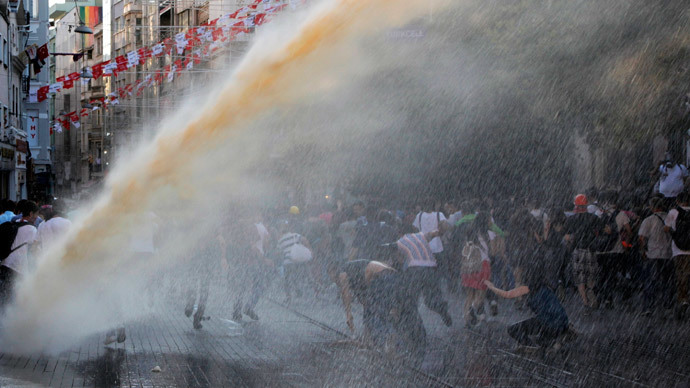Turkey under the helm of Recep Tayyip Erdogan has seen the erosion of human rights via a crackdown on media freedom, dissent and a weakening of the rule of law, Human Rights Watch (HWR) warned in its latest report.
The 38-page report outlining the “worrying rollback” of human rights over Ergodan’s 12-year reign was published on Monday.
Erdogan, who won the presidential poll in August after serving as prime minister for over a decade, has increasingly come under fire amidst mounting opposition protests and corruption allegations targeting both him and his inner circle. Damaging leaks linked to the influential Gülen movement, led by the US-based cleric Fethullah Gülen, and the violent crackdown on the Gezi Park protests in Istanbul and other cities in May-June 2013 have spurred Erdogan to react with increasingly authoritarian measures.
“Over the past year, Erdogan’s AKP (Justice and Development Party) has responded to political opposition by tearing up the rule book, silencing critical voices, and wielding a stick,” said Emma Sinclair-Webb, senior Turkey researcher at Human Rights Watch and author of the report. “For the sake of Turkey’s future and the rights of its citizens, the government needs to change course and protect rights instead of attacking them."
Corruption & media crackdown
In December 2013, a major corruption scandal implicating senior government officials and members of their families was met with attempts to stifle the investigation. According to HRW, the government responded by attempting to limit police powers and tightening their reigns over the judiciary by “reassigning judges, prosecutors, and police officers, and more recently by arresting police officers involved in the investigations.”
The government is also accused of attempting to silence social media and traditional media reports on the corruption cases, including through bans on YouTube and Twitter.

The most recent attacks on social media hit in March, just weeks before local elections in Turkey. Several weeks prior, leaked phone conversations allegedly between Erdogan and his son Bilal dating back to December 17, 2013 – the day the major corruption operation was made public – surfaced on YouTube.
In the audio recordings, a voice alleged to be Erdogan’s can be heard telling his son to dispose of at least $1 billion in cash stashed in five houses on the same day police raided a number of locations as part of the operation.
The leaks have been linked to Gülen, whose followers have allegedly infiltrated the police, intelligence services, and judiciary, justifying subsequent purges and attempts to stifle all forms of media.
Large parts of the media, and in particular television, also toe a pro-government line and do nothing to challenge those in power, HRW said.
Turkey is currently ranked 154th out of 180 countries in the 2014 RSF press freedom index.
"The space for independent, nonaligned and critical journalism in Turkey has shrunk," HRW said, citing the prosecution of two journalists for the Taraf daily.
In November 2013, the paper published a series of confidential documents suggesting that the ruling party and the National Intelligence Organization (MIT) profiled individuals linked to religious and faith-based groups.
While AKP admitted to the authenticity of the documents, the journalists face harsh prison sentences for leaking the MIT files. To further indemnify the intelligence service, a law was passed in April 2014 law granting MIT personnel immunity unless the organization gives express permission for it to be removed.
Skewed justice
HRW further took aim at the country’s criminal justice system, which it says is deeply politicized and lacks independence.
"The government feels no hesitancy to intervene in the criminal justice system when its interests are threatened," said HRW, noting that thousands of employees in the security forces and legal system had been fired due to a lack of “loyalty.”
Meanwhile, at least 5,500 people have been put on trial across the country for their involvement in the 2013 protests, while police acted with “near impunity” during their violent crackdown. The recent jailing of a police officer for eight years over the killing of a protester in Ankara was called a “rare moment of accountability.”
Kurdish question
HRW cited a December 2012 aerial bombardment near Uludere in southeastern Turkey, in which 34 cigarette smugglers were killed after wrongly being identified as Kurdish militants, as another example of the authorities acting with impunity. Recently, a prosecutor decided not to charge any members of the air force with the killings, the victims of which included both men and boys.
Meanwhile, investigations into a wave of killings and disappearances of Kurds that took place from 1993-1995, when Kurdish militants made a strategic shift towards urban terrorism, is soon to fall under a 20-year statute of limitations.
The group does note, however, that the “embryonic Kurdish peace process offers the greatest possibility for improving Turkey’s human rights record by correcting the rights deficit for Kurds that lies at the heart of the conflict.”
Recommendations
“Turkey is unlikely to succeed in moving closer to Europe unless Turkey's leaders take steps to reverse the rollback on rights and strengthen the rule of law," HRW's Turkey researcher Emma Sinclair-Webb said.
HRW says Turkey needs to introduce more robust and independent official bodies and oversight mechanisms to keep public officials in check.It also calls for a revival of cross-party efforts to kick start 2012 efforts to draft a new constitution which would replace the current national charter. That document was drafted up under a military regime.
Further action is called to complete comprehensive anti-discrimination legislation which the government has talked up for years, but never drafted or submitted to parliament.

